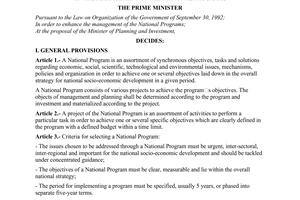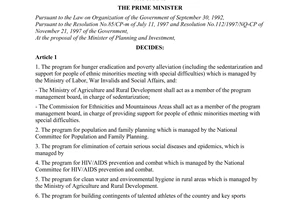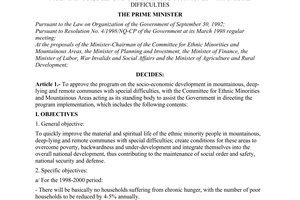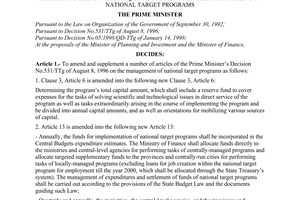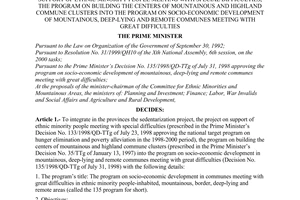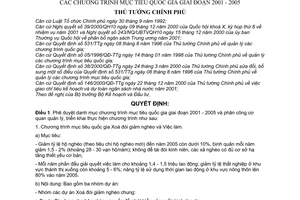Nội dung toàn văn Decision No.71/2001/QD-TTg, on the National target programs in the 2001-2005 period, promulgated by the Prime Minister of Government.
|
THE
PRIME MINISTER OF GOVERNMENT |
SOCIALIST REPUBLIC OF VIET NAM |
|
No: 71/2001/QD-TTg |
Hanoi May 04, 2001 |
DECISION
ON THE NATIONAL TARGET PROGRAMS IN THE 2001-2005 PERIOD
THE PRIME MINISTER
Pursuant to the Law on Organization of the
Government of September 30, 1992;
Pursuant to Resolution No. 39/2000/QH10 of December 9, 2000 of the Xth
National Assembly at its 8th session, on the 2001 tasks and Resolution No.
243/NQ/UBTVQH10 of December 15, 2000 of the National Assembly Standing
Committee on the allocation of the central budget in 2001;
Pursuant to the Prime Ministers Decision No. 531/TTg of August 8, 1996 on
the management of national programs;
Pursuant to the Prime Ministers Decision No. 05/1998/ QD-TTg of January 14,
1998 on the management of national target programs;
Pursuant to the Prime Ministers Decision No. 38/2000/QD-TTg of March 24,
2000, amending and supplementing a number of articles of the Prime Ministers
Decision No. 531/TTg of August 8, 1996 on the management of national target
programs;
Pursuant to the Prime Ministers Decision No. 146/2000/QD-TTg of December 22,
2000, on the assignment of the plan norms and the State budget estimate in
2001;
At the proposal of the Minister of Planning and Investment,
DECIDES:
Article 1.- To approve the list of national target programs in the 2001-2005 period and assign the agencies to manage and deploy the implementation thereof as follows:
1. The national target program on hunger eradication, poverty alleviation and employment
a/ Objectives:
- To reduce by 2005 the percentage of poor households (according to the new criteria for poor households) to below 10%, or an average of 1,5% - 2% each year (about 28,000 - 30,000 households/year); to stop chronic relapse in hunger and ensure that poor communes have basic infrastructures;
- To strive to create jobs for about 1.4 - 1.5 million people each year; to reduce the unemployment rate in urban areas to about 5% - 6%; to increase the percentage of working time in rural areas to 80% by 2005.
b/ Contents: Including three groups of projects:
- The group of general hunger eradication and poverty alleviation projects:
+ The credit project to lend capital to poor households for production and business development;
+ The project to guide poor people on ways of earning a living, to promote agriculture, forestry and fishery;
+ The project to build hunger eradication and poverty alleviation models in special areas (areas inhabited by ethnic minorities, coastal areas, highland and border areas, islands, former resistance bases, deep-lying areas in the Mekong River delta);
- The group of hunger eradication and poverty alleviation projects for poor communes not covered by program 135:
+ The project to build infrastructures in poor communes;
+ The project to support production and development of business lines and trades in poor communes;
+ The project to train and foster personnel for hunger eradication and poverty alleviation activities and officials of poor communes;
+ The project to stabilize the life of migrants and build new economic zones in poor communes (including: stabilizing the life of free migrants, migrants under new economic zone construction and population redistribution according to the planning; projects under the former program 773 of the agricultural sector under the Prime Ministers regulations in Document No. 1123/CP-NN of December 6, 2000 on the transfer of projects under program 773);
+ The project on sedentarization in poor communes.
(Communes meeting with special difficulties, which may continue to implement the projects under program 135 on "socio-economic development in communes meeting with special difficulties in ethnic minority, mountainous, border, deep-lying and remote areas" - a special hunger eradication and poverty alleviation program of the Government - with the Committee for Ethnic Minorities and Mountainous Areas as the standing body, according to the Prime Ministers Decisions No. 135/1998/QD-TTg of July 31, 1998 and No. 138/2000/QD-TTg of November 29, 2000, shall not be regulated by this Decision).
- The group of employment projects:
+ The project to organize the lending of capital under mini-projects for job creation through the National Employment Support Fund;
+ The project to raise the capacity and modernize the Employment Service Centers;
+ The project to survey and gather statistics on the labor market and build a labor market information system;
+ The project to train and foster personnel for the job creation work.
c/ Assignment of the program management and implementation.
- The Ministry of Labor, War Invalids and Social Affairs: To manage, administer and synthesize the general situation on the program implementation; to assume the prime responsibility and coordinate with the Ministry of Agriculture and Rural Development, the Committee for Ethnic Minorities and Mountainous Areas, the Ministry of Health, the State Bank of Vietnam, the concerned ministries and branches, and the Peoples Committees of the provinces and centrally-run cities (hereinafter called the localities for short) in managing and organizing the implementation of the following projects:
+ The project to train and foster personnel for the hunger eradication and poverty alleviation work and officials of poor communes;
+ The project to build hunger eradication and poverty alleviation models in special areas (areas of ethnic minorities, coastal areas, highland and border areas, islands, former resistance bases, deep-lying areas in the Mekong River delta);
+ The project to organize the capital lending according to mini-projects on job creation through the National Employment Support Fund;
+ The project to raise the capacity and modernize the Employment Service Centers;
+ The project to survey and gather statistics on the labor market and build a labor market information system;
+ The project to train and foster personnel for the job creation work.
- The Ministry of Agriculture and Rural Development: To assume the prime responsibility and coordinate with the Ministry of Labor, War Invalids and Social Affairs, the National Committee for Population and Family Planning, the concerned ministries and branches, and the localities in managing and organizing the implementation of the following projects:
+ The project to build infrastructures in poor communes;
+ The project to support production and development of business lines and trades in poor communes;
+ The project to guide poor people on ways of earning a living, to promote agriculture, forestry and fishery;
+ The project to stabilize the life of migrants and build new economic zones in poor communes (including: stabilizing the life of free migrants, migrants under new economic zone construction and population redistribution according to planning; projects of the former program 773 of the agricultural sector according to the Prime Ministers regulations in Document No. 1123/CP-NN of December 6, 2000 on the transfer of projects under program 773);
+ The project on sedentarization in poor communes.
- The State Bank of Vietnam: To assume the prime responsibility and coordinate with the Ministry of Labor, War Invalids and Social Affairs, the concerned ministries, branches and localities in directing the Bank for the Poor to manage and organize the implementation of the credit project to lend capital to poor households for production and business development.
- The Ministry of Health: To assume the prime responsibility and coordinate with the Ministry of Labor, War Invalids and Social Affairs, the concerned ministries, branches and localities in studying and elaborating the policy on medical examination and treatment for the poor and submitting it to the Government for decision.
- The Committee for Ethnic Minorities and Mountainous Areas: To coordinate with the concerned ministries and branches in managing and organizing the implementation of hunger eradication, poverty alleviation and employment projects.
- The National Committee for Population and Family Planning: To coordinate with the Ministry of Agriculture and Rural Development in managing and organizing the implementation of the project to stabilize the life of migrants and build new economic zones in poor communes.
2. The national target program on clean water and environmental hygiene in rural areas.
To comply with the provisions of Clause 2, Article 2 of the Prime Ministers Decision No. 104/2000/QD-TTg of August 25, 2000 approving the national strategy for clean water supply and rural sanitation till 2020.
3. The national target program on population and family planning
a/ Objectives:
- To concentrate every effort on achieving the objective of steady birth rate reduction, particularly focusing on areas with high birth rates, deep-lying, remote and poor areas in order to achieve the national average birth rate by no later than 2005. To reduce the annual birth rate by 0.04% on average; to achieve the population growth rate of about 1.16% by 2005.
- To initially deploy the experimental models and solutions to improve the population quality.
b/ Contents: Including the following projects:
- The communication, education and behavioral change project;
- The project to further provide reproductive health care/family planning services for poor, difficulty-hit, deep-lying and remote areas;
- The project to improve the quality of population information and data;
- The project to study issues related to the population quality;
- The project to integrate population with sustainable family development through credit and saving activities and development of the family economy;
- The project to raise the managerial capacity of personnel engaged in population activities;
- The project on reproductive health care/family planning services, consisting of two mini-projects:
+ The mini-project on the provision of reproductive health care/family planning services;
+ The mini-project on the provision of non-clinical reproductive health care/family planning services and ensure family planning logistics supply.
c/ Assignment of the program management and implementation:
- The National Committee for Population and Family Planning: To manage, administer and synthesize the general situation on the program implementation; to assume the prime responsibility and coordinate with the Ministry of Health, the concerned ministries, branches and localities in managing and organizing the implementation of the following projects:
+ The communication, education and behavioral change project;
+ The project to further provide reproductive health care/family planning services for poor, difficulty-hit, deep-lying and remote areas;
+ The project to improve the quality of population information and data;
+ The project to study issues related to the population quality;
+ The project to integrate population with sustainable family development through credit and saving activities and development of the family economy;
+ The project to enhance the managerial capacity of personnel engaged in population activities;
+ The mini-project on the provision of non-clinical reproductive health care/family planning services and family planning logistics supply.
- The Ministry of Health:
+ To assume the prime responsibility and coordinate with the National Committee for Population and Family Planning, the concerned ministries, branches and localities in managing and organizing the implementation of the mini-project on the provision of reproductive health care/family planning services.
+ To coordinate with the National Committee for Population and Family Planning, the concerned ministries, branches and localities in managing and organizing the implementation of the project to further provide reproductive health care/family planning services for poor, difficulty-hit, deep-lying and remote areas.
4. The national target program to prevent and combat some social diseases, dangerous epidemics and HIV/AIDS.
a/ Objectives:
To reduce the morbidity and mortality rates, contributing to increasing the physical strength, increase the life expectancy and develop our race; to strive to ensure that every citizen enjoy primary healthcare services; to speed down the HIV infection in the community.
b/ Contents: Including the following projects:
- The project to prevent and fight malaria;
- The project to prevent and fight goiter;
- The project to prevent and fight leprosy;
- The project to prevent and fight tuberculosis;
- The project to prevent and fight petechial fever;
- The expanded immunization project;
- The project to prevent and fight child malnutrition;
- The project to protect the communitys mental health;
- The project to ensure food safety, hygiene and quality;
- The project to prevent and fight HIV/AIDS.
c/ Assignment of the program management and implementation:
The Ministry of Health: To manage and execute the program; to assume the prime responsibility and coordinate with the concerned ministries, branches and localities in managing and organizing the implementation of the projects under the program.
5. The national target program on culture
a/ Objectives:
- To conserve and promote the nations typical cultural values;
- To build and develop the cultured life at the grassroots level;
- To modernize the film production, archival and dissemination technologies.
b/ Contents: Including the three following groups of projects:
- The group of projects to conserve and promote the nations typical cultural values:
+ The project against the degradation and for the replenishment of historical, revolutionary and resistance war relics;
+ The project to study, survey and conserve a number of typical rural and mountainous villages and hamlets and unique traditional rituals of ethnic minority groups;
+ The project to collect and conserve typical non-material cultural values; to establish a data bank for the non-material culture;
- The group of projects to build a cultured life at the grassroots level:
+ The project to build grassroots culture and information institutions; to build models of culture and information activities in villages and communes (paying special attention to deep-lying, remote, mountainous and ethnic minority areas in order to narrow the cultural enjoyment gap between regions);
+ The project to build cultured rural and mountainous villages, communes and wards;
+ The project to supply cultural and information products to the grassroots level;
+ The project to promote cultural and information activities in the border areas and islands (in coordination with the Border Guard Command);
- The group of projects to modernize the film production, archival and dissemination technologies:
+ The project to provide modern equipment and techniques for the film production and archive;
+ The project to provide modern equipment and techniques for the film dissemination;
+ The project to train and raise the skills to use modern technologies in the film production, archive and dissemination.
c/ Assignment of the program management and implementation:
The Ministry of Culture and Information: To manage and execute the program; to assume the prime responsibility and coordinate with the concerned ministries, branches and localities in managing and organizing the implementation of the projects under the program.
6. The national target program on education and training
a/ Objectives:
- To realize the universalization of junior-high education nationwide by 2010, in 30 provinces and cities by 2005;
- To renew the curriculum and textbooks contents.
- To raise the percentage of trained labor to 40% of the total labor within the prescribed age range by 2010, and 30% by 2005; to adjust the manpower training structure in terms of the training level, business line and territory to be suitable to the demands of the national industrialization and modernization; to accelerate the training of informatics personnel and the introduction of informatics into schools.
b/ Contents: Including the following projects:
- The project to consolidate and promote the results of primary education universalization and illiteracy eradication, to realize the universalization of junior-high education;
- The project to renew the curriculum and textbooks contents;
- The project to train informatics personnel and introduce informatics into schools;
- The project to train and foster teachers and strengthen material bases for pedagogical colleges and universities;
- The project to support education in mountainous, ethnic minority and difficulty-hit areas;
- The project to strengthen material foundations in schools, general technical and vocational guidance centers; to build some key universities and specialized secondary schools;
- The project to enhance the job training capacity.
c/ Assignment of the program management and implementation:
- The Ministry of Education and Training: To manage, administer and synthesize the general situation on the program implementation; to assume the prime responsibility and coordinate with the Ministry of Labor, War Invalids and Social Affairs, the concerned ministries, branches and localities in managing and organizing the implementation of the following projects:
+ The project to consolidate and promote the results of primary education universalization and illiteracy eradication, to realize the universalization of junior-high education;
+ The project to renew the curriculum and textbooks contents;
+ The project to train informatics personnel and introduce informatics into schools;
+ The project to train and foster teachers and strengthen material bases for pedagogical colleges and universities;
+ The project to support education in mountainous, ethnic minority and difficulty-hit areas;
+ The project to strengthen material foundations in schools, general technical and vocational guidance centers; to build some key universities and specialized secondary schools.
- The Ministry of Labor, War Invalids and Social Affairs: To assume the prime responsibility and coordinate with the Ministry of Education and Training, the concerned ministries, branches and localities in organizing the implementation of the project to enhance the job-training capacity.
Article 2.- Elaboration and submission of the national target programs for approval
1. The agencies in charge of managing the national target programs shall elaborate the programs for the 2001-2005 period according to the objectives and projects specified in Article 1 of this Decision and submit them to the Prime Minister for approval within the second quarter of 2001.
2. The Ministry of Planning and Investment shall assume the prime responsibility and coordinate with the Ministry of Finance, the concerned ministries and branches in organizing the appraisal of the national target programs specified in Article 1 of this Decision and submit them to the Prime Minister for approval.
Article 3.- The mechanism of managing and administering the national target programs
1. Annually, the Prime Minister shall assign the ministries, the central agencies and the Peoples Committees of the provinces and centrally-run cities the norms on total fundings of the national target programs, which comprise the capital construction funding and the public service funding.
2. The Prime Minister shall authorize the Minister of Planning and Investment to assign the ministries, the central agencies and the Peoples Committees of the provinces and centrally-run cities the norms guiding the annual objectives and tasks of each program.
3. On that basis, the Ministry of Finance shall assign the detailed estimates and directly allocate the fundings already balanced in the annual central budgets spending estimate to the ministries and central agencies for the performance of the tasks of the centrally-run national target programs.
The Ministry of Finance shall effect the targeted additional allocations to the provinces and centrally-run cities according to the plan on the allocation of the funding to the national target programs to be implemented in their respective areas as arranged by the Peoples Committees of the provinces and centrally-run cities.
4. Annually, the agencies that manage the national target programs shall draw up the plans and funding needs for the program implementation, then send them to the Ministry of Planning and Investment and the Ministry of Finance. On the basis of the total fundings expected to be allocated to the programs, notified by the competent authorities, the program-managing agencies shall make tentative plans on their allocation to the ministries, central agencies and provinces and centrally-run cities, send them to the Ministry of Planning and Investment and the Ministry of Finance for consideration and synthesization before submitting them to the Prime Minister for decision; the program-managing agencies shall refrain from assigning plans and notifying fundings of the programs to their subordinate specialized agencies in the provinces and cities.
The program-managing agencies shall provide technical and professional guidance and coordinate with the Ministry of Finance in providing guidance on the uniform spending norms for the ministries, central agencies as well as the provinces and centrally-run cities so that the latter can take initiative in the implementation thereof; direct, urge, supervise and evaluate the situation on the program implementation.
5. The presidents of the Peoples Committees of the provinces and centrally-run cities shall be tasked to deploy the implementation of the national target programs in their respective localities; take initiative in integrating the programs, arranging the funding and planning the allocation thereof to each specific program; mobilize additional capital sources according to regulations for the implementation of the programs; make and send annual and quarterly reports on the program implementation to the program-managing agencies, the Ministry of Planning and Investment and the Ministry of Finance; and, at the same time, take responsibility to the Government for the efficient use of this funding source.
6. For the former national target programs, as from 2001 their cost estimates shall be included into the regular spending tasks according to the corresponding domains of the ministries, central agencies and localities. For the ministries and central agencies, grants shall be directly allocated to them for program implementation; for localities, grants shall be incorporated in the total additional allocations from the central budget to the local budgets. (Particularly for the tasks of expanding the radio broadcasting coverage as well as the television broadcasting coverage in 2001, they shall be performed according to the mechanism stated in the Prime Ministers Decision No. 146/2000/QD-TTg of December 22, 2000).
Article 4.- This Decision takes effect as from the date of its signing.
Article 5.- The ministers, the heads of the ministerial-level agencies, the heads of the agencies attached to the Government and the presidents of the Peoples Committees of the provinces and centrally-run cities shall have to implement this Decision.-
|
|
PRIME MINISTER |
